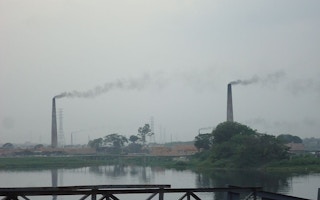It’s a sign of the times that even the International Monetary Fund (IMF) is exploring ways in which it can help address the climate crisis. Building on two new IMF papers released last week and Managing Director Christine Lagarde’s eight years of leadership, this mainstay of traditional economic thought is lending its voice and unique mandate to the cause of tackling climate change.
More specifically, the IMF is working to better reflect climate resilience in macro-fiscal and financial frameworks, assess the fiscal and financial impacts of climate policy choices, and mainstream climate risk into its country assessments. As Lagarde noted, “Climate change is the great existential challenge of our times.” It is high time this reality is appropriately reflected in the IMF’s work.
What’s new from the IMF?
One of the new papers is a comprehensive update of global fossil fuel subsidies and negative externalities like air pollution. The paper found that the world is wasting a whopping 6.5 per cent of global GDP—$ 5.2 trillion per year—subsidizing dirty energy.
Under-pricing of local air pollution, which the World Health Organisation estimates kills 4.2 million people each year, is the largest part of these costs. Coal remains the largest recipient of subsidies, despite being the most polluting.
For the first time, the IMF’s subsidies assessment is paired with a new paper exploring how countries can apply a range of fiscal policies to deliver their goals under the international Paris Agreement on climate change, and what the IMF can do to support them.
The paper emphasised the central importance of carbon pricing and measures to reduce fossil fuel subsidies, as well as the importance of accompanying measures like investments in R&D, infrastructure investment, financial market policies, and strategies to support vulnerable groups.
These two papers from the IMF Fiscal Affairs Department are excellent. The challenge now is to integrate the wealth of guidance they contain into relevant work across the rest of the IMF, as well as into national policies.
“
Under-pricing of local air pollution, which the World Health Organisation estimates kills 4.2 million people each year, is the largest part of these costs.
What are the IMF and others doing now?
Indeed, the IMF has already begun to integrate some of the macro-fiscal and financial implications of climate change into other areas of its work. Through its annual Article IV Consultations, where analysts assess countries’ current and future economic health, the IMF has helped identify ways in which some countries can align macro-economic and fiscal policies with climate resilience.
This seemingly unexciting development was in no small part driven by the wake-up call of recent extreme weather events, including Hurricane Maria in 2017, which decimated islands in the Caribbean.
With the realities of climate change starting to hit economies around the world, the ever-pragmatic financial sector has also been waking up to climate risks. Signs of this shift were captured in the New Climate Economy’s September 2018 report. Just months since its release, we’ve seen this momentum snowball.
For example, the Task Force on Climate-related Financial Disclosures (TCFD) set forth a series of recommendations in July 2017 to increase transparency around the material financial risks of climate change in order to improve investment decisions.
The uptake of these recommendations in a relatively short period is remarkable: The TCFD now boasts more than 500 supportive companies with a combined market capitalisation of more than $7.9 trillion, including 287 financial firms responsible for assets of nearly $100 trillion.
And what could be a clearer symbol of this shift than Norway’s trillion-dollar Sovereign Wealth Fund—itself built on oil and gas revenues—excluding fossil fuel exploration and production companies in its investment profile in order to reduce risks to the Norwegian economy?
How can the IMF and others step up on climate action?
This notable shift in the financial sector, added to the infectious passion coming from Fridays for Future school strikes, the Green New Deal, the Extinction Rebellion protests and others, now puts the onus squarely on our political and institutional leaders to step up climate action.
For the IMF, this is an excellent opportunity to build on the great work it has started and to more systematically promote the use of economic and fiscal policy to drive national climate action, including through the recently launched Coalition of Finance Ministers for Climate Action.
And it means moving beyond a focus on climate impacts to also grapple with the macro-critical implications of transitioning to net-zero carbon economies. The IMF should integrate climate risk assessment into all Article IV Consultations, for every country and for every year, as well as take other important steps to support this agenda.
For country leaders, it’s all about action—not for the sake of distant generations, but for people here now. The economic and social benefits of low carbon development, worth $26 trillion between now and 2030, are there for the taking. That includes 65 million new jobs in 2030, as well as 700,000 fewer deaths from air pollution.
Indonesia is a good example of how countries can seize this opportunity. Under its new Low Carbon Development Initiative, it is now making ambitious climate action part of its next five-year development plan, putting the country on a path to meet or exceed its emissions-reduction goals while achieving 6 per cent GDP growth per year between 2019 and 2045, outpacing business-as-usual growth.
That a resource-rich, fossil fuel-dependent, populous and growing economy like Indonesia is making this shift should make every finance minister stop and think, as should the fact that the IMF is actively looking at how to integrate climate risks across its work.
The world is up against a climate countdown, with not a moment to lose. As Lagarde said, “Action is required by everyone, every institution, every country.” There are no excuses for, nor any reason to delay the transition to a new climate economy.
Helen Mountford is the vice president for Climate and Economics at World Resources Institute (WRI). This article was originally published on the WRI blog.











